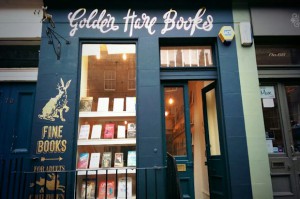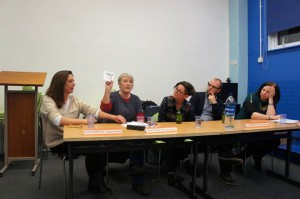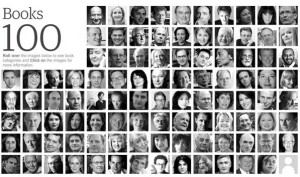On Wednesday 19th November, in the Central Library in Edinburgh, SYP Scotland held a seminar discussing the future of Indie Bookshops. The panelists included representatives from four Independent Bookshops in Edinburgh: Gillian Robertson from Looking Glass Books, Elaine Henry from Word Power Books, Ian Macbeth from Golden Hare Books and Marie Moser from The Edinburgh Bookshop. Each representative spoke about what was next for them, what had changed over the last few years and what changes were still to come as independent booksellers adapt their business models in a bid to hold on to their share of the book market. The event was chaired by Peggy Hughes, Programme Director of the Dundee Literary Festival, Co-ordinator of the Dundee International Book Prize, and sundry other projects and publications at Literary Dundee. Peggy was also one of the judges for the Scottish Mortgage Investment Trust Book Awards 2013 and a Trustee for Reel Arts. By night, Peggy is also the Programme Director of the West Port Book Festival and one third of Electric Bookshop.
The Independent Booksellers:
Looking Glass Books
Looking Glass Books is a bookshop and café that was set up in Edinburgh’s Quartermile in 2012. Gillian Robertson explained that the bookshop was opened when the industry was already where it is now, and so they haven’t had to do a lot of adapting. Their strategies have been more focused on who they are, where they might go and how they might place themselves within the industry.
Word Power Books
It has been 20 years since Elaine Henry cut the red ribbon to Word Power Books in West Nicolson Street. Even after their 20 year success, Elaine said that there are still people who come into the store and ask how long they have been open for. Sometimes thinking, ‘what are we doing wrong that people still don’t know our existence’, Elaine believes this to be one of the major challenges of being an independent bookseller. Independent bookshops are not one homogenous group, and Word Power Books is what Elaine would call a radical bookshop dedicated to supporting small presses and independent presses (although they would get anything in for their customers). Word Power Books also publish, having done 22 titles. Their latest book, The Liberty Tree, about the Scottish radical Thomas Muir, was a leading review in the Sunday Times. Elaine commented that this feat meant they had finally been given some recognition for what they do after 20 years in the business.
Golden Hare Books
Golden Hare Books opened 3 years ago and is based in St. Stephen Street, Stockbridge. Ian Macbeth described the shop as having a curated feel, like many independent bookshops, distinguishing itself from larger chains.
The Edinburgh Bookshop
The Edinburgh Bookshop, nestled at Holy Corner in Bruntsfield, was opened 7 years ago and bought by Marie Moser just 2 years ago. Since then Marie has benefited from a double turnover and successes such as winning the UK Children’s Bookseller 2014 and being named Scottish Independent Bookshop 2014. Discussing the obvious successes of her predecessor, Marie nonetheless talked about the importance of accepting what you are and what works for your customers rather than what you want to be or feel you should be. When Fifty Shades of Grey came out it was 15% of the book market, and although, as Marie acknowledged, ‘ it might be considered by some people to be a rubbish piece of writing, it was the biggest thing since Harry Potter’. Marie’s predecessor would not stock the book, telling people they would need to go across the road to Tesco. Marie’s position on this kind of mentality was simple: ‘As a small independent retailer you have to get off your high horse’.
Existing Relationships with Digital
When discussing independent bookshops’ relationship with digital, Marie challenged that as yet the world might be 50% digital but not everything in the world is digital. In Britain we buy physically half a million books a day, not E-books, physical books! That might be massively down on 20 years ago, but according to Marie, if you found any businessman who was setting up a business and you said to him you could sell him half a million units a day, could he honestly think that wasn’t one cracking business? In relation to social media, however, Marie questioned the practical uses of Twitter. Although a tweeter herself, since Marie has come into the industry, her opinion has become more inclined to regard it as a platform for the way the industry talks to itself.
Continuing with this discussion, Peggy Hughes humorously compared being good at Twitter as like ‘being good at the egg and spoon’. Ian Macbeth also likened twitter to playing ‘Guitar Hero’, with links to articles and people’s opinions coming at you all the time, just like the coloured blocks in the game. Ian also felt that it was a platform where it was difficult to make your voice heard. Although he does tweet about events and interesting books that have come into his store, Ian believes that interpersonal links are far more important, with tools such as a mailing list being a much better way to keep in touch with your customers. Although many people do love a mailing list, in today’s digital age it may be seen as archaic. Overall, Ian felt that Facebook had less impact than Twitter but that mailing lists and store websites were much more significant tools for promotional activity from the standpoint of an independent bookseller.
In a rather different digital era, Elaine Henry first used microfiche to look up books. From stock-card indexing to today’s methods, Elaine has definitely seen first hand the rising demand for instant response. In terms of twitter Elaine said, ‘I don’t tweet because I just don’t have the time. This thing that you should be sending out three tweets a day, I just find it a challenge’. However, when informed by Peggy that she had been tweeted by Russell Brand, an astonished Elaine relented to find a positive outcome to the social media platform, laughing, ‘I guess sometimes Twitter can work to your advantage’.
Gillian Robertson also commented that she tweeted regularly, but was quick to point out that you can’t have blanket rules for every bookstore. Gillian did agree with Marie’s opinion that Twitter was a way in which the industry spoke to itself, but pointed out that it depends on whom you follow. Gillian follows local independent businesses and Edinburgh locals, which she believes, has been crucial to her success. ‘I don’t know if we would have been able to get off the ground without social media’.
Indie Bookshop VS. Amazon
Marie Moser was of the opinion that businesses could not be future proofed, claiming that in today’s day and age, ‘there is no room to be mediocre, if you are not interested and engaged you are not going to make money’. Marie’s basic view of digital was that it was a society and that Amazon was at the pinnacle of it.
Ian was quick to point out that it’s not just Amazon, it’s supermarkets, Waterstones, etc. Independent booksellers cannot match the discounts of these large retailers, and even if they could, they wouldn’t want to. Ian’s theory is that if you can’t offer the same discounts you have to offer people something else. Amazon can never provide the same experience as bricks and mortar bookshops as they are selling on experience and Amazon is selling on instant gratification.
Within Word Power Books they have leaflets exhibiting quotes such as ‘think before you click’ and ‘discounts don’t come for free’. Marie’s agreement with these slogans prompted her to challenge the role of the publisher, arguing that there is a danger the industry is losing sight of volume and bestsellers versus actually making profit, therefore illustrating the idea that any fool can sell something cheap. Marie commented that when you let big chains heavily discount your lead title you devalue that brand and you devalue the years of work that the writer undertook to make the product. The fact that publishers should value what they sell was most evidently what offended Marie the most.
Marie also argued that publishers, as an industry, are letting retailers hammer down prices. If you were to ask the public if they wanted to buy products as cheap as they could, it is inevitable that they would say yes. The reality, according to Marie, is that this is not true or we wouldn’t have luxury brands; ‘We will buy what we think is a fair price for something nice’.
The seminar ended on the positive note that since 2009 there has been a resurgence of independent bookshops. According to all four of the independent booksellers, what we need to do is look at what is driving this; it may be a small movement, but it can have a big impact. Overall, for independent bookshops world domination is not on their agenda, however, they do not just want to survive, because that’s a low bar; they want to thrive, and as far as the seminar proved, Amazon is not going to stop them.







 In order to explain how he became involved with John Smith’s, Dr Frost gave us a potted pre-history of the current bookselling situation in Britain. John Smith’s has been around since 1751, so it has survived and responded to the major changes that have happened in the bookselling industry over the last several centuries, from the 1899 establishment of the
In order to explain how he became involved with John Smith’s, Dr Frost gave us a potted pre-history of the current bookselling situation in Britain. John Smith’s has been around since 1751, so it has survived and responded to the major changes that have happened in the bookselling industry over the last several centuries, from the 1899 establishment of the 



